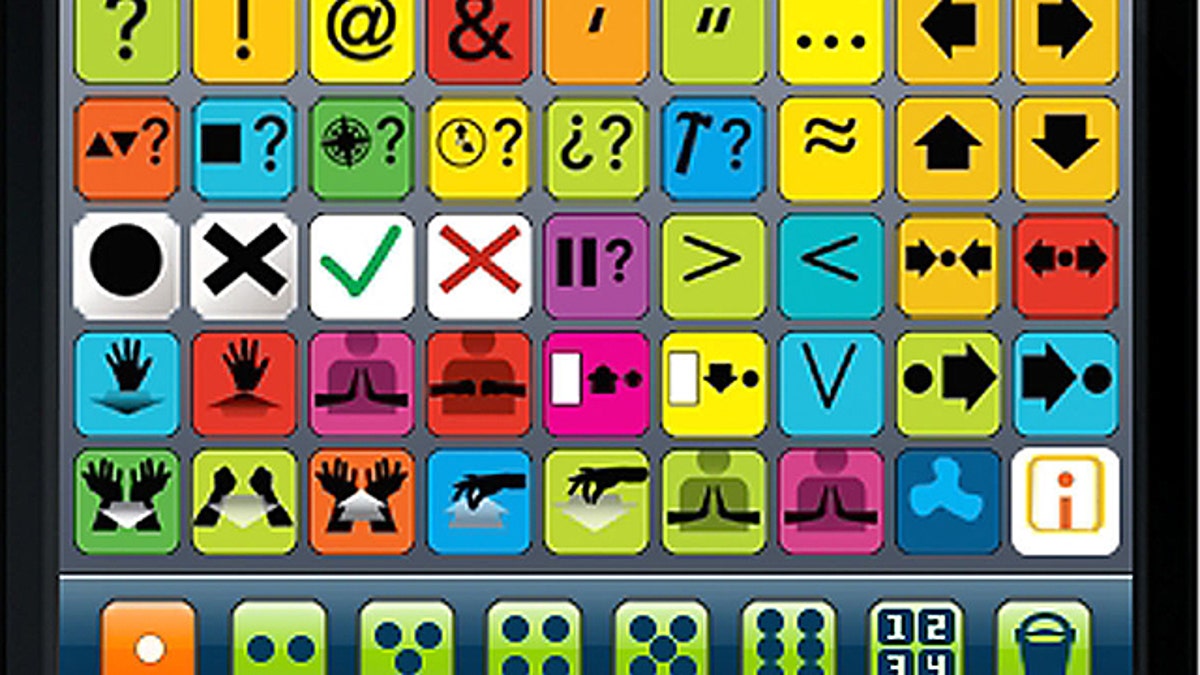
Creator Over the Sun LLC describes its hieroglyphic-like new language for cell phone messaging as Conji is a fun, new way to communicate using a vocabulary of pictographs. (PRNewsFoto/Over the Sun, LLC)
Modern man no longer communicates via cave painting, yet hieroglyphs may be making a comeback -- thanks to the cell phone.
Colorado native Kai Staats has invented a new language for cell phones that replaces words with pictures to represent actions, nouns, and places, making his invention essentially a modern form of the hieroglyphics used in ancient Egypt.
The language, which Staats calls "iConji," consists of 32x32 pixel square images that convey either a single meaning, such as "sports car," or a dual meaning such as "food" plus "to eat." It's available for Apple devices like the iPad and iPhone, as a Facebook application, or as a Web application that runs in Firefox or Safari.
"It's just fun to use," explains the inventor. "Using homonyms and plays-on-words, iConji messages are often quite humorous as well as informative. Whether you are sending a complete sentence with proper grammar to a co-worker, or a simple, one-character message inviting a friend for a drink after work, receiving an iConji message always causes me to smile."
It seems similar to Chinese, but linguist Arika Okrent explains that the pictograms used in iConji are far removed from that language.
"The characters represent spoken words, not concepts," she told FoxNews.com. "They're more complicated than alphabetic writing, but over 90% of them give you some clue about the sound of the word." iConji's images don't work in the same way, she noted.
"The same goes for hieroglyphics," she adds, a linguistic system in which "the symbol for a viper didn't represent a viper, but the sound "f". There is no full language that depends on a pictorial principle -- including sign languages."
The iConji vocabulary launches with 1,185 characters, each translated into English, Spanish, French, Italian, German, Hindi, Mandarin Chinese, and Japanese, with Turkish and Swahili in progress. But Staats believes iConji will rapidly evolve. He told the Northern Colorado Business Report that users will submit their own symbols, quickly growing the language -- though not all symbols will transcend cultural barriers. The symbol for "hello" -- an open hand with an outward pointing arrow -- might carry different connotations in different countries. That's why any user can submit his or her own symbol, with the added incentive of being able to track its use.
Sure, it may be fun, but will it be easy to use? One expert is skeptical.
"Speed input? This dramatically slows input!" said PCMag.com's lead cell phone analyst Sasha Segan. He called it a "silly novelty app," and thinks iConji will work only because "people generally text other people they know, and they usually have a language in common."
The real question is utility, thinks Alan Timberlake, professor of Slavic languages and chair of the linguistics department at Columbia University. He wonders whether pictograms or "ideograms" can express enough.
"Think of emoticons and abbreviations like 'lol,' he told FoxNews.com. "They can’t express everything. It seems to be quite difficult to learn a large number of distinct symbols (learning Chinese characters takes non-natives much longer than learning words in a language with an alphabet). In short, if it works, which means if people use it and develop it, let’s congratulate them, but the project has built-in limitations."
Others are more enthusiastic, including Dan Burcaw, CEO of developer Double Encore, which built the iPhone app for Staats. Burcaw called iConji a "game-changer," adding, "as technology evolves, it's projects like iConji that take full advantage of devices such as the iPhone, opening the door to a whole new way of thinking about human communication."
People have been rethinking communication for centuries, notes Okrent, who wrote the book on alternative languages -- literally. It's called In the Land of invented Languages, and in it the author -- a first-level Klingon speaker herself -- examines the quest for new ways of speaking.
"People have been trying to come up with universal, simple, easily understood languages for almost 1,000 years, and they almost always fail," she told FoxNews.com.
Okrent explained that the developer reached out to her for advice prior to releasing iConji. "I told him that the chances for success in this kind of project are slim."
Segan mentions that, as people have sought “universal” languages over the centuries, "many attempts have become cult hits -- Esperanto comes to mind. But what Okrent proves is that to have a hit synthetic language, you basically have to have a culture around it."
Still, Okrent agrees with Staats that iConji could be entertaining. "All it will take is enough people who find it fun."
"And really, when it comes to convincing people to give anything a try, fun usually trumps usefulness anyway. Witness the success of Klingon and Na'vi!"








































